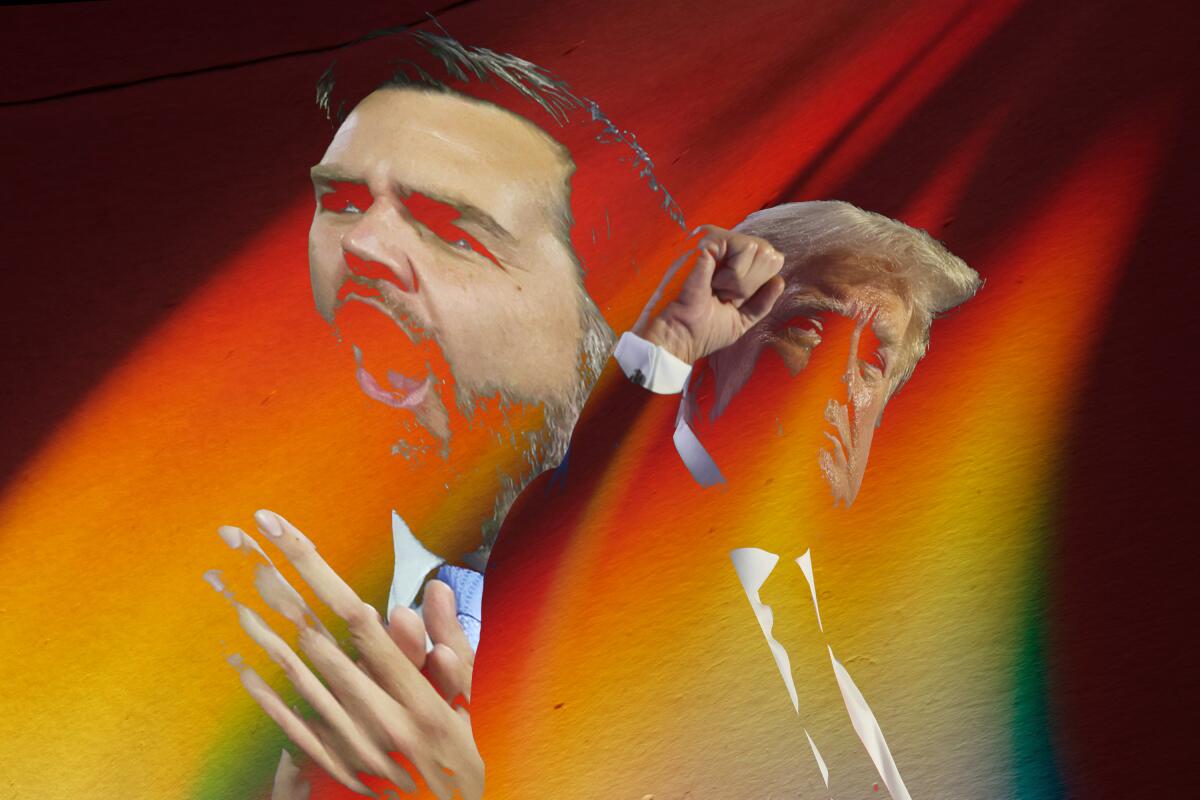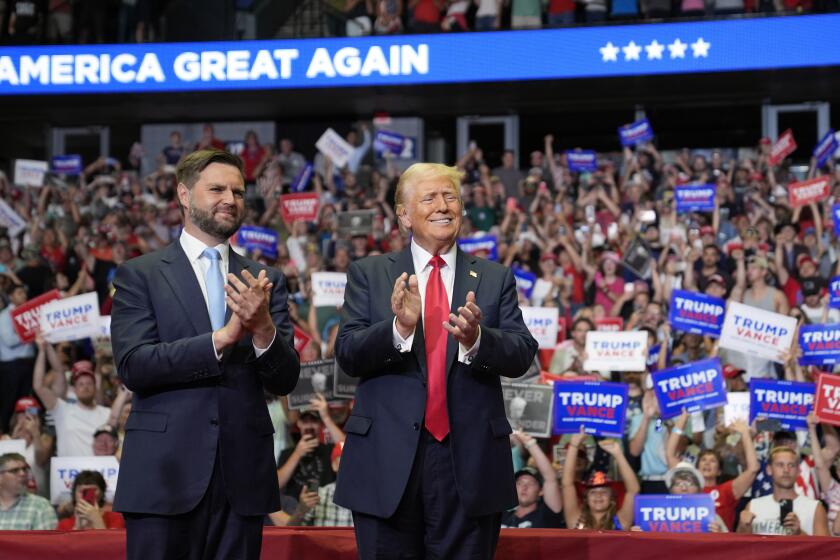Opinion: The problem with calling Trump and Vance weird

- Share via
Democratic politicians and pundits have recently begun throwing this insult at Republican presidential contender Donald Trump and his running mate, JD Vance: “weird.” As a scholar who has made my academic career in part by celebrating weirdness, I object. Trump and Vance don’t deserve the compliment.
The weird should be understood as whatever is strikingly contrary to the ordinary, predictable and readily comprehensible. It is a contrast with the normal. Consider blades of grass. Although no two are exactly the same, their variation keeps to certain limits. But here’s a blade that splits into three halfway up, with each finger curling around in a loop. Why would it do that? Now that’s a weird blade of grass!
Recently, my family and I visited Hayao Miyazaki’s Ni-Tele Really Big Clock in Tokyo. What a weird object: It looms from the side of a skyscraper, featuring mannequins and giant bird claws. When noon strikes, one claw opens to reveal a smiling sun, a fish tail bangs a gong and a bell-headed mannequin enacts a goofy dance. Nature also offers plenty of weirdness, such as the miraculously thin, Seussian piles of stone in Utah’s Bryce Canyon, the surreal mineral-deposit terraces of Pamukkale in Turkey and gloriously bizarre fish and fungi around the world.
By dismissing Donald Trump and J.D. Vance as ‘weird,’ the Democrats have defanged Republicans’ campaign of fear — and started to drive GOP leaders crazy.
The Democrats are getting mileage from calling Trump and Vance “weird.” The word has been used enough by allies of Vice President Kamala Harris and her presidential campaign to receive substantial news coverage as a political strategy, even praise for its success. The resonance of this strategy seems to reflect a widespread misunderstanding of who is really weird. The term should conjure the guy who rides through Berkeley on a unicycle, wearing a top hat; the business school standout who drops out to live on an organic seed farm; the middle school kid who plasters their bedroom with posters of squids and snails, ignoring pop culture in favor of a deep fascination with mollusk biology. Each is, in their own way, a wonder of nature, and the world is richer for having them.
Trump’s and Vance’s behavior, on the other hand, reflects something more troubling. Their views toward women and reproductive rights, for example — demeaning the former and opposing the latter — are inappropriate and deservedly in the minority. But those views, unfortunately, are not rare enough to be truly weird. In fact, in contemporary America, Trump and Vance are normal, predictable and readily understood. They are ordinary, self-serving politicians, conforming to the demands of those who have rewarded their behavior.
And even if these perspectives were more unusual, that would not be the source of these politicians’ badness. Yes, some unusual things are bad, such as serial killings. And Trump does have his head-scratching moments — consider the frequent references to fictional serial killer Hannibal Lecter on the campaign trail. But things and people are not bad because they are weird. It seriously misrepresents the nature of Trump’s and Vance’s departure from liberal values to treat weirdness as their headline flaw.
If the GOP takes the White House, that likely means mixed results for regulation of Big Tech.
What is it to be liberal? It is to tolerate, or even to celebrate, others with different values and practices. Liberal parents permit their children to make choices other than their own. Liberal societies are pluralistic and egalitarian, not requiring citizens to adhere to mainstream culture and religion.
There are always some gardeners who would prefer to mow down the weird blade of grass, and some people are similarly made uncomfortable by others they regard as weird. These are the people for whom “weird” is the choicest insult. In the conformist hellscape of middle school (or at least of some middle schools), bands of lookalike kids who prize their normality — even more, their being perceived as normal — taunt the kids who don’t easily fit in, such as the mollusk lover. I was insulted as “weird” in school myself. But I grew to embrace my own weirdness and weirdness in general. I realized that to use “weird” as an insult is implicitly to accept a conformist worldview — a worldview that devalues rather than appreciates difference and novelty.
Our Democratic politicians and pundits are, and should be, better than that. The Democrats pride themselves on being the party of diversity, on accepting people with a wide range of worldviews, cultures, sexual orientations, life experiences and interests, on making room for nonconformists and those outside the mainstream.
Using “weird” as a term of mockery, as though that’s the best descriptor of Trump and Vance, may be politically advantageous right now. But it denigrates the truly weird. It’s more accurate to call Trump and Vance liars, authoritarians, conscienceless political shape-shifters and wrong on policy. Those are ample, and more appropriate, reasons to vote against them.
Eric Schwitzgebel is a professor of philosophy at UC Riverside and author of “The Weirdness of the World.”
More to Read
A cure for the common opinion
Get thought-provoking perspectives with our weekly newsletter.
You may occasionally receive promotional content from the Los Angeles Times.












